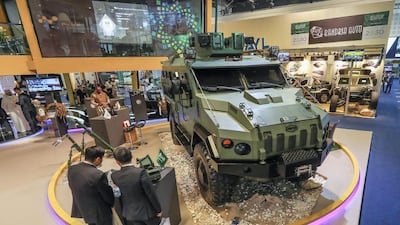Gulf and Arab allies have been urged to join forces in the research and development of advanced technology to bolster security and reduce reliance on imports.
“What I would like to see is more focus on collaboration ... this region could be a [powerhouse] for innovation,” said UAE Minister of Energy and Infrastructure Suhail Al Mazrouei yesterday.
“We cannot just rely on importing innovation from abroad. The tech we have today will enable our universities and companies to work together in a more collaborative manner so we can compete much stronger as a region.
“We hope that this model, that we have proven works in the UAE, can be adopted at a regional scale, which will provide prosperity and security and enable youths to innovate globally.”
The minister was speaking at the International Defence Conference, part of the biennial five-day defence exhibition in Abu Dhabi.
The conference focused on cyber security, R&D, supply chains and the protection of Fourth Industrial Revolution technology and artificial intelligence.
Saudi Arabia said joint efforts on defence-related R&D need to be assessed on a case-by-case basis, balancing co-operation with competition.
The kingdom will invest about $20 billion in its defence sector over the next decade as part of plans to localise half of its military spending by 2030, the head of the country’s military industry regulator told the conference.
“The government has put a plan that we will be investing in excess of $10bn on the military industry in Saudi Arabia over the next decade and equal amounts on research and development,” said Ahmad AlOhali, governor of the General Authority for Military Industries.
The kingdom intends to raise its spending on military research and development from 0.2 per cent to 4 per cent by 2030, putting it on par with the global average, said Mr AlOhali.
Collaboration with the UAE, the US and Europe will help Saudi Arabia reach that level, he said.
“Collaboration is very important and sometimes when you have joint requirements for collaboration, different countries have different needs on the same weaponry and that may clear some inefficiency or increase in costs,” he said.
“So, you have to be agile, it is a case-by-case [approach] where you say, ‘I want to collaborate on such basis’ or ‘I need to have my sovereignty for that’. We look at it on a case-by-case basis.”
Saudi Arabia is developing its domestic military industry amid plans to produce arms locally. The kingdom intends to spend half of its defence budget on local procurement.
“It is a very ambitious, very aggressive vision but with the help of of our friends and allies, I am sure we will be making very good pace,” said Mr AlOhali.
The conference also highlighted the importance of protecting AI and other Fourth Industrial Revolution technology used in military systems.
It also reflected on the impact of the Covid-19 pandemic on global supply chains, particularly for strategic sectors such as health care, transport and defence.
“This compels us to rethink supply chains to make them more resilient and flexible in the face of various challenges in the future,” UAE Minister of State for Defence Affairs Mohammed Al Bawardi said.
Fourth Industrial Revolution technology is “highly important for the future of our defence capabilities”, he said.


